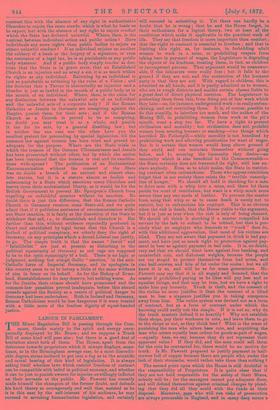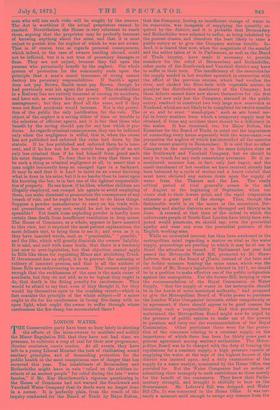LABOUR IN PARLIAMENT.
THE Mines' Regulation Bill is passing through the Com- mons, thanks mainly to the spirit and energy unex- pectedly displayed by Mr. Bruce ; and we suppose a Truck Bill of some kind will pass also ; but there is a good deal of hesitation about both of them, The House, apart from the deference towards proprietors which it always displays, some- times, as in the Birmingham sewage case, to a most discredit- able degree, seems inclined to get into a fog as to the scientific and moral bearing of this kind of legislation, It is always asking itself whether laws which restrict freedom of contract can be compatible with belief in political economy, and whether it can be just to punish owners for injuries unwillingly inflicted on their servants or the public. Mr. Fawcett has recently made himself the champion of the former doubt, and defends his hard theory so courageously and well that, assisted as he is in this case by the self-interest of his audience, he may succeed in arresting humanitarian legislation, and certainly
will succeed in enfeebling it. Yet there can hardly be a doubt that he is wrong ; that he and the House forget, in their enthusiasm for a logical theory, two at least of the conditions which make it applicable to the practical work of life. They say that freedom is more important than comfort ; that the right to contract is essential to freedom ; and that in limiting this right, as, for instance, in forbidding adult women to work in a mine, or prohibiting reapers from taking beer in payment of wages, the Legislature is degrading the objects of its kindness, treating them, in fact, as children or incompetent persons. That argument would be unanswer- able, if the labourers were really free ; but it falls to the ground if they are not, and the contention of the humane party is that they are not. With regard to children, this is admitted on all hands, and it is partly admitted as to women, who are in rough districts and amidst certain classes liable to a great deal of direct physical coercion. The Legislature in protecting them from this, from doing out of fear work which they hate—as, for instance, underground work—is really enfran- chising, and not restricting them. It is, of course, possible to do this stupidly, to interfere too much, and the author of the Mining Bill, in prohibiting women from work at the pit's mouth, went a step too far. We have a right to protect civilisation and morality ; but civilisation does not prohibit women from wearing trousers or smoking—two things which horrified Mr. Fothergill—while morality is not benefited by prohibiting work and allowing prostitution for want of wages. But it is certain that women would keep above ground if they could, and can maintain themselves without going below, and is securing the immunity they desire—an immunity which is also beneficial to the Commonwealth— the State certainly does not transcend its right, still less en- slave anybody. Even as to adult males, the State in restrict- ing contract often enfranchises. Those who oppose restriction forget that in our society there exists the " terrible conscrip- tion of hunger." We should all hold it shocking for a man to drive men with a whip into a mine, and there let them perish for want of ventilation, but want is a whip much more severe than any one made of leather. To prevent the master from using that whip so as to cause death is surely not to restrict, but to enfranchise his employe's. This is so obvious when the risk is death, that the House yields to the argument, but it is just as true when the risk is only of being cheated. We khould all think it shocking if a master compelled his servant by the lash to submit to be robbed, but that is pre- cisely what an employer who descends to " truck " does do, with this additional aggravation, that most of his victims are blind. They are not aware that payment in drink is bad pay- ment, and have just as much right to protection against pay- ment in beer as against payment in bad coin. It is, no doubt, very sad that we should want laws against free banking, and counterfeit coin, and dishonest weights, because the people are too stupid to protect themselves from bad notes, and zinc half-crowns, and bits of fat under the scales ; but we all know it is so, and will be so for some generations. Mr. Fawcett may say that it is all supply and demand, that the master if prohibited paying as he likes will pay less and so equalise things, and that may be true, but we have a right to make him pay honestly. Truck is theft, and the consent of the victim no more justifies it than the consent of a blind man to lose a sixpence justifies you in taking ninepence away from him. The entire system was devised not as a form of contract, but as a form of contract under which the knowing could easily rob the simple. If it is not so, why do the truck masters defend it so heartily ? Why not establish their shops, pay their workmen in coin, and leave them to go to the shops or not, as they think best ? What is the sense of punishing the man who utters base coin, and acquitting the man who utters equally base orders for goods as part of wages, —equally base, we say, because they do not represent their apparent value ? If they did, and the man could sell them for the coin he contracted for, there would be no motive for truck. Is Mr. Fawcett prepared to justify payment in half- crowns full of copper because there are people who, under the lash of their stomachs, would rather take them than nothing ?
The second point upon which the House is still doubtful is the responsibility of Proprietors. It is quite clear that if they are not held responsible for the safety of their Mines, nobody will be ; for the managers cannot pay adequate fines, and will defend themselves against criminal charges by plead- ing that they did all they could with the funds at their disposal. Moreover, men who will run risks of prosecution are always procurable in England, and in many deep mines a man who will run such risks will be sought by the owners. The Act is worthless if the actual proprietors cannot be reached. Nevertheless, the House is very reluctant to reach them, arguing that the proprietor may be perfectly innocent of knowing anything about the mine, and that it is most unjust to punish him for neglect of which he was not aware. That is, of course, true as regards personal consequences, which indeed, in the case of owners residing abroad, could not be inflicted, but it is not true of pecuniary damages or fines. They are not unjust, because they fall upon the persons who pecuniarily benefit by the neglect. Our whole system of protection for the community rests upon the principle that a man's moral innocence of wrong cannot destroy his pecuniary responsibilities. If Smith's agent does not pay Brown, Smith mast pay Brown, though he had previously sent his agent the money. The shareholders in a Railway line are entirely innocent of causing its accidents, and have not, as owners have, any power of controlling the management ; but they are fined all the same, and if they were not fined accidents would increase. Nor is the protec- tion of the public the only justification for the rule. The object of the neglect is a saving either of time or trouble in the selection of efficient agents, and it is fair that those who benefit by the saving should pay for any loss which it pro- duces. As regards criminal consequences, they can be inflicted only when the negligence is wilful, that is, when the owner has not published and enforced the rules laid down by the statute. If be has published and enforced them he is inno- cent, and if he has not, he has surely been guilty of an act only less criminal than if he had himself from greed made his mine dangerous. To deny that is to deny that there can be such a thing as criminal negligence at all, to assert that a man might innocently keep an uncaged tiger in a backyard. It may be said that it is hard to insist on an owner knowing what is done in his mine, but it is no harder than to insist upon his knowing the law, is in fact one of the lightest responsibili- ties of property. He can know, if he likes, whether children are illegally employed, can compel his agents to avoid employing them, can make dismissal or prosecution the consequence of any breach of rule, and he ought to be bound to do those things. Suppose a powder manufacturer to carry on his trade with- out precautions of any sort, would he not be criminally re- sponsible V Yet death from exploding powder is hardly more certain than death from insufficient ventilation in deep mines. The House of Commons, as a whole, appears to have assented to this view, but it required the most patient explanations, the most delicate tact, to bring them to see it ; and even as it is, they have inserted words, such as " practicable," " possible," and the like, which will greatly diminish the owners' liability. It is said, and said with some truth, that there is a tendency just now to over-legislation, but that objection cannot apply to Bills like those for regulating Mines and abolishing Truck. If Government has an object, it is to prevent the maiming or robbery of innocent persons, and that is all the authors of these Bills are endeavouring to secure. The owners say justly enough that the recklessness of the men is the main cause of accidents, but they do not add, as to be logical they ought to do, that death is the fitting penalty for carelessness. They would be afraid to say that, even if they thought it, for they would lay themselves open to the crushing retort—which in fact contains the principle of the whole subject—If a miner ought to die for his carelessness in facing fire-damp with an open light, what ought the owner to suffer through whose carelessness the fire-damp has accumulated there I



































 Previous page
Previous page